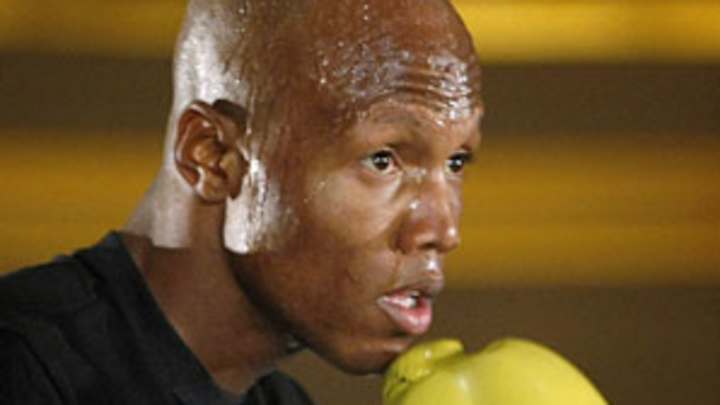Zab Judah puts tumultuous past behind him for one last shot at top

Think back to Judah, circa 2001. In those days the New Yorker was a baby-faced 22-year-old with speed, power and a honed killer instinct. Straight out of the same Brooklyn neighborhood that produced Mike Tyson, Judah talked the talk -- "When I'm in my 50s and 60s people will talk about Ali, Tyson and Zab Judah," Judah once said -- and could walk the walk. The first time he sparred with Pernell Whitaker, Whitaker left the ring swearing it felt like he was sparring himself. Judah won his first Golden Gloves tournament a year before he was eligible, thanks to a birth certificate his father, Yoel, doctored for him. He was a world champion at 21 and fighting for the undisputed junior welterweight title at 23.
The rise was meteoric. The fall came just as fast.
He was a 3-to-1 favorite entering that 2001 unification fight against Kostya Tszyu. But Judah couldn't make it three rounds, eating two flush right hands in the second, the last of which put Judah down. He got up, stumbled a few steps like a man on the back end of a Vegas bachelor party and eventually wound up flat on his face. When referee Jay Nady waved the fight off, Judah shoved a glove in Nady's chest and, later, tossed a stool in his direction.
• Crash Course: Your guide to Khan-Judah
Judah rebounded from the loss, claiming a piece of the 140-pound title two fights later before moving up to welterweight. He knocked out Cory Spinks in Spinks's hometown of St. Louis in 2005 to become the undisputed champion, but followed it up with three losses (and one no-contest) in his next five fights, cultivating a reputation for fading in the later rounds.
Judah says he is a different fighter today, smarter, more experienced. He says the move back to 140 pounds -- a division he probably should have never left -- has been good for him, that his power and speed are more effective at lighter weights.
He says he has become more fundamentally sound, thanks in part to the guidance of Whitaker, who came on board as his trainer before his last fight.
"Pernell, he tapped into my memory and has made me remember a lot of good things," Judah said. "He just showed me what it is to be a scientific boxer. I added that to my style. We have a complete, full version of Zab Judah, the way that the world knows him to be. This is the guy that you people love and the guy that you wanted to see."
At 33, Judah's time in boxing is finite. He's an HBO headliner again, having won a piece of the 140-pound crown in his last fight. But the margin for error now is razor thin. Every fight isn't a must-win for Judah. Yet. But it's close.
Standing in the middle of the road back is Khan, who Judah will face on Saturday at the Mandalay Bay Event Center in Las Vegas (10 p.m. ET/7 p.m. PT, HBO). Khan's path to this point is eerily familiar. Khan, 24, is an accomplished amateur, an Olympic silver medalist who has quickly become one of the biggest stars in the U.K. Khan has -- and stop me if you have heard this before -- fast hands, slashing power and a flair for the dramatic. Backed by trainer Freddie Roach, Khan is being groomed as the next big star in boxing.
Judah knows he is considered the B-side of this promotion. He resents it -- on a recent conference call Judah refused to answer questions from the British press because Khan wouldn't give him a nickel of the U.K. revenue -- but he gets it. It motivates him, this strange, come-full-circle course of events. Indeed, this is Judah's chance to do to Khan what Tszyu did to him a decade ago. Like Tszyu, Judah is a heavy underdog (5-to-1) given little chance to win. He is being talked about as a steppingstone, a tuneup for Khan before bigger matchups with Timothy Bradley and Floyd Mayweather next year.
Let them think that, Judah says. Boy, will they be surprised.
"I don't know who [Khan's team is ] looking at as far as when they speak about speed and power, but evidently they're watching the wrong tapes," Judah said. "They're going to be in for a world of surprises. I understand the people over there are misleading the young guy and telling him this and telling him that. But I think when the bell rings, after the first round he'll come back to the corner and go, 'Wait a minute. This is not what we prepared for guys. You told me it was going to be a different kind of Judah in there.'"
This is Judah's moment. The days of "Super Judah," the possibilities of a legendary career are gone. He has paid a heavy price for his failures, from fines to suspensions to public ridicule for his boorish behavior. But here, Judah can still add a few more chapters in his book. And it starts with Khan.

Chris Mannix is a senior writer at Sports Illustrated covering the NBA and boxing beats. He joined the SI staff in 2003 following his graduation from Boston College. Mannix is the host of SI's "Open Floor" podcast and serves as a ringside analyst and reporter for DAZN Boxing. He is also a frequent contributor to NBC Sports Boston as an NBA analyst. A nominee for National Sportswriter of the Year in 2022, Mannix has won writing awards from the Boxing Writers Association of America and the Pro Basketball Writers Association, and is a longtime member of both organizations.
Follow sichrismannix